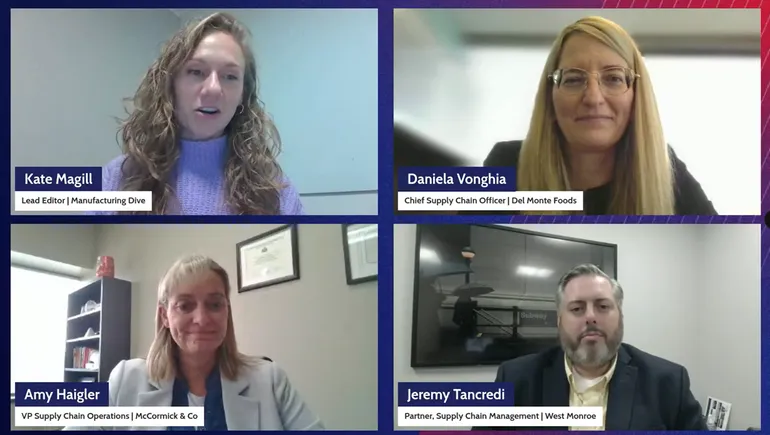With global trade in flux as the Trump administration moves forward with its tariff strategy, U.S. food manufacturers are looking to be flexible and swift with their decision-making to mitigate higher costs and supply chain pressures.
Supply chain experts discussed this topic during a virtual State of Innovation in Food Manufacturing event hosted by Manufacturing Dive and Food Dive. Speakers included Amy Haigler, VP of supply chain operations at McCormick & Co. in the Americas; Daniela Vonghia, chief supply chain officer at Del Monte Foods; and Jeremy Tancredi, partner of operations excellence and supply chain management at West Monroe.
The event coincided with President Donald Trump’s announcement of a 90-day pause on most reciprocal tariffs, setting a 10% baseline tariff for all countries except China, which faces a higher 125% duty on goods entering the U.S.
“Having agility in everything we do is the key for our manufacturing supply chain right now,” Haigler emphasized in light of the daily changes in tariff news affecting supply chains.
McCormick’s global presence includes major hubs in North America, Europe, and China, with 28 manufacturing plants worldwide, including three in China. Haigler highlighted the company’s ability to leverage a vast network of suppliers for more than 20,000 raw materials, enabling flexibility in product sourcing decisions.
Del Monte Foods is also adapting its sourcing and supplier strategies to navigate trade uncertainty and potential supply chain disruptions.
Manufacturers are turning to automation and AI software to address labor shortages and enhance supply chain efficiency. Vonghia stressed the importance of quality data aligned with key performance indicators for successful digital transformations.
As companies like McCormick focus on real-time data for sourcing decisions, maintaining clean and up-to-date master data is crucial, Haigler noted.
While some manufacturers are expanding in the U.S. to mitigate tariffs, others are cautious, with Tancredi advising against hasty supply chain overhauls without considering long-term impacts.
Rising tariffs are driving up building materials costs, with warehousing lease costs for third-party logistics providers increasing by 12% over the past year. Tancredi warned that coupled with tariffs, these cost increases could hinder supply chain growth.

